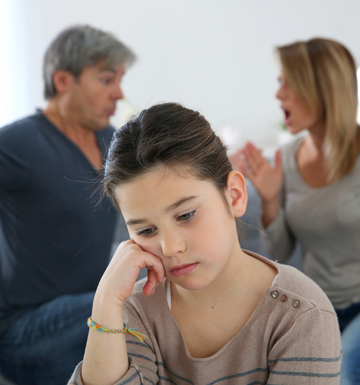 Love and Relationships
Love and Relationships
Psychological Effects of Divorce on Children
Divorce is a life-changing event for children. Feelings of abandonment and confusion often abound. A child’s response depends on many variables. Some of these include their age, personality, individual and family history, and how their parents cope. A child’s perception also has an impact and may include blame; self-blame for their parents’ breakup or blame placed on their parents for upending their life.
Thoughts and feelings impacting a child’s wellbeing may include insecurity, distrust, fear of change, and fear of conflict. Emotions regarding divorce can range from anger to rage, sadness to depression, anxiety to panic, doubts about parental love, loneliness, and overwhelming feelings of loss.
Divorce does increase the risk of behavior and psychological problems. You can expect children will grieve and feel pain. Divorce is a breakup of the family unit. Grief is a normal response to loss of the family as the child knows it. Anger is an emotion often used unconsciously to cover up feelings of sadness, grief or pain.
Younger children up to age 8 or 9 may regress, throw tantrums, become clingy, suffer separation anxiety, and wet the bed long after potty training. Children at these ages are dependent on the family for their social life, home life and friends. They are likely to be anxious and worried because there is so much that is unfamiliar. Common concerns include: Who will I live with? Who will take care of me? Insecurity, fear and anxiety can awaken wishful thinking which creates fantasies of the parents reuniting.
Adolescents are already working on becoming independent from their parents. Divorce may intensify the child’s efforts at independence and self-sufficiency. They may act out, become aggressive and display their anger in unacceptable ways, as an expression of their pain or need for attention. They may be hurtful when they feel upset and angry. They may suffer academically or exhibit behavioral problems. They may also indulge in drugs and alcohol to manage their distress. Physical symptoms like headaches, asthma, and stomachs may appear. This can be the case for younger children as well.
All of these symptoms, sadness, anxiety and depression, and their physical manifestations, are known responses to a family breaking up. Serious problems for children whose parents are undergoing divorce may include self-harm and suicidal ideation. When you see that your child is suffering, or exhibiting disturbing behavior seek immediate help.
What can divorcing parents do to help their children survive and thrive?
The impact of divorce can last into adulthood especially when children experience their own romantic relationships. Children learn their first lessons in love from their parents. How you model love and help them manage negative emotions is key.
Divorce impacts the hearts, minds and souls of children. Restoring trust in their safety, security, and wellbeing is important. Maintaining or reestablishing routines and rituals goes a long way. Offering reassurance and showing love verbally and nonverbally is paramount.
Palos Verdes Estates Psychologist Dr. Angela Bisignano will tell you that what parents do during and after divorce matters. How they cope with their emotions, how they work together, and relate to each other is key to influencing your child’s resiliency in coping with divorce. Unmanaged negative emotions and conflict are damaging to you and your children. Left unchecked they can have long-term implications on future relationships and wellbeing.
Here are a few tips for promoting your children’s resiliency and well-being during divorce:
- Allow them to feel and express their pain and sadness
- Acknowledge their grief, loss, and uncertainty about the future
- Help them navigate difficult emotions
- Model for them healthy behavior
- Manage your stress in healthy ways
- Protect them from any anger or resentment you may have toward your spouse
- Don’t force them to choose one parent over the other
- Listen to their complaints
- Don’t use them as messengers between you and your spouse
- Show them how much you love them
- Understand they may need a therapist to help them process their thoughts and feelings
When you are struggling with your own thoughts and feelings and need a safe place you may need the help of a psychologist. How you navigate this difficult transition is important for both you and your children. If you need marriage counseling or guidance through a divorce contact Dr. Angela Bisignano today.
Reference:
“The Truth About Children and Divorce: Dealing with the Emotions So You and Your Children Can Thrive” by Robert E. Emery, PhD
